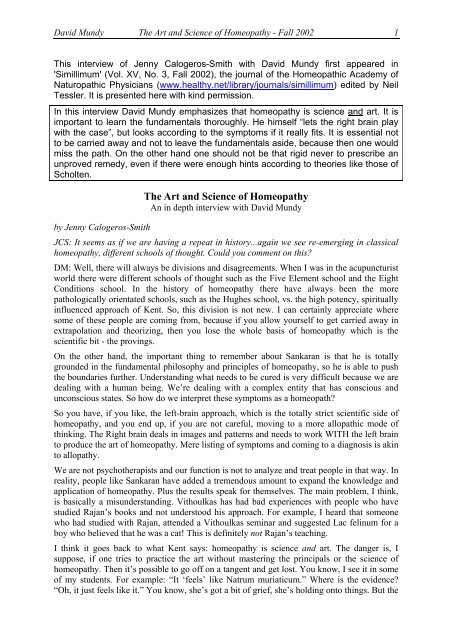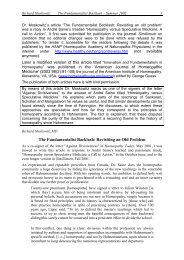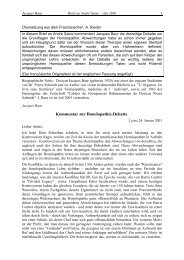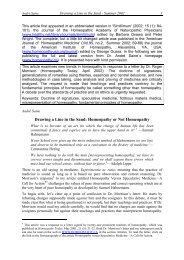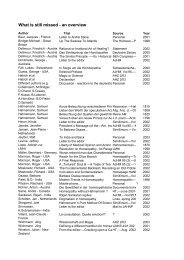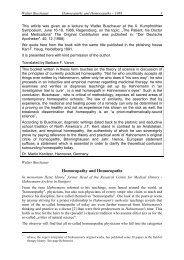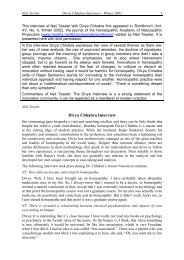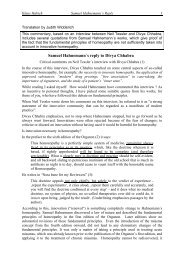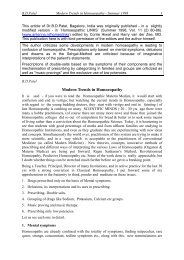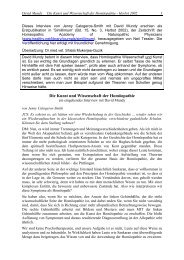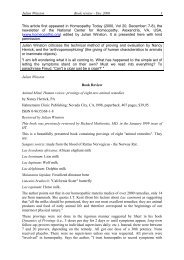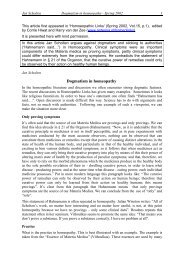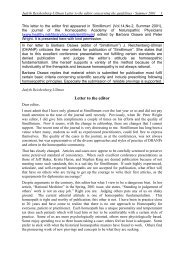The Art and Science of Homeopathy An in depth interview with David
The Art and Science of Homeopathy An in depth interview with David
The Art and Science of Homeopathy An in depth interview with David
Create successful ePaper yourself
Turn your PDF publications into a flip-book with our unique Google optimized e-Paper software.
<strong>David</strong> Mundy <strong>The</strong> <strong>Art</strong> <strong>and</strong> <strong>Science</strong> <strong>of</strong> <strong>Homeopathy</strong> - Fall 2002 1<br />
This <strong>in</strong>terview <strong>of</strong> Jenny Calogeros-Smith <strong>with</strong> <strong>David</strong> Mundy first appeared <strong>in</strong><br />
'Simillimum' (Vol. XV, No. 3, Fall 2002), the journal <strong>of</strong> the Homeopathic Academy <strong>of</strong><br />
Naturopathic Physicians (www.healthy.net/library/journals/simillimum) edited by Neil<br />
Tessler. It is presented here <strong>with</strong> k<strong>in</strong>d permission.<br />
In this <strong>in</strong>terview <strong>David</strong> Mundy emphasizes that homeopathy is science <strong>and</strong> art. It is<br />
important to learn the fundamentals thoroughly. He himself “lets the right bra<strong>in</strong> play<br />
<strong>with</strong> the case”, but looks accord<strong>in</strong>g to the symptoms if it really fits. It is essential not<br />
to be carried away <strong>and</strong> not to leave the fundamentals aside, because then one would<br />
miss the path. On the other h<strong>and</strong> one should not be that rigid never to prescribe an<br />
unproved remedy, even if there were enough h<strong>in</strong>ts accord<strong>in</strong>g to theories like those <strong>of</strong><br />
Scholten.<br />
by Jenny Calogeros-Smith<br />
<strong>The</strong> <strong>Art</strong> <strong>and</strong> <strong>Science</strong> <strong>of</strong> <strong>Homeopathy</strong><br />
<strong>An</strong> <strong>in</strong> <strong>depth</strong> <strong>in</strong>terview <strong>with</strong> <strong>David</strong> Mundy<br />
JCS: It seems as if we are hav<strong>in</strong>g a repeat <strong>in</strong> history...aga<strong>in</strong> we see re-emerg<strong>in</strong>g <strong>in</strong> classical<br />
homeopathy, different schools <strong>of</strong> thought. Could you comment on this?<br />
DM: Well, there will always be divisions <strong>and</strong> disagreements. When I was <strong>in</strong> the acupuncturist<br />
world there were different schools <strong>of</strong> thought such as the Five Element school <strong>and</strong> the Eight<br />
Conditions school. In the history <strong>of</strong> homeopathy there have always been the more<br />
pathologically orientated schools, such as the Hughes school, vs. the high potency, spiritually<br />
<strong>in</strong>fluenced approach <strong>of</strong> Kent. So, this division is not new. I can certa<strong>in</strong>ly appreciate where<br />
some <strong>of</strong> these people are com<strong>in</strong>g from, because if you allow yourself to get carried away <strong>in</strong><br />
extrapolation <strong>and</strong> theoriz<strong>in</strong>g, then you lose the whole basis <strong>of</strong> homeopathy which is the<br />
scientific bit - the prov<strong>in</strong>gs.<br />
On the other h<strong>and</strong>, the important th<strong>in</strong>g to remember about Sankaran is that he is totally<br />
grounded <strong>in</strong> the fundamental philosophy <strong>and</strong> pr<strong>in</strong>ciples <strong>of</strong> homeopathy, so he is able to push<br />
the boundaries further. Underst<strong>and</strong><strong>in</strong>g what needs to be cured is very difficult because we are<br />
deal<strong>in</strong>g <strong>with</strong> a human be<strong>in</strong>g. We’re deal<strong>in</strong>g <strong>with</strong> a complex entity that has conscious <strong>and</strong><br />
unconscious states. So how do we <strong>in</strong>terpret these symptoms as a homeopath?<br />
So you have, if you like, the left-bra<strong>in</strong> approach, which is the totally strict scientific side <strong>of</strong><br />
homeopathy, <strong>and</strong> you end up, if you are not careful, mov<strong>in</strong>g to a more allopathic mode <strong>of</strong><br />
th<strong>in</strong>k<strong>in</strong>g. <strong>The</strong> Right bra<strong>in</strong> deals <strong>in</strong> images <strong>and</strong> patterns <strong>and</strong> needs to work WITH the left bra<strong>in</strong><br />
to produce the art <strong>of</strong> homeopathy. Mere list<strong>in</strong>g <strong>of</strong> symptoms <strong>and</strong> com<strong>in</strong>g to a diagnosis is ak<strong>in</strong><br />
to allopathy.<br />
We are not psychotherapists <strong>and</strong> our function is not to analyze <strong>and</strong> treat people <strong>in</strong> that way. In<br />
reality, people like Sankaran have added a tremendous amount to exp<strong>and</strong> the knowledge <strong>and</strong><br />
application <strong>of</strong> homeopathy. Plus the results speak for themselves. <strong>The</strong> ma<strong>in</strong> problem, I th<strong>in</strong>k,<br />
is basically a misunderst<strong>and</strong><strong>in</strong>g. Vithoulkas has had bad experiences <strong>with</strong> people who have<br />
studied Rajan’s books <strong>and</strong> not understood his approach. For example, I heard that someone<br />
who had studied <strong>with</strong> Rajan, attended a Vithoulkas sem<strong>in</strong>ar <strong>and</strong> suggested Lac fel<strong>in</strong>um for a<br />
boy who believed that he was a cat! This is def<strong>in</strong>itely not Rajan’s teach<strong>in</strong>g.<br />
I th<strong>in</strong>k it goes back to what Kent says: homeopathy is science <strong>and</strong> art. <strong>The</strong> danger is, I<br />
suppose, if one tries to practice the art <strong>with</strong>out master<strong>in</strong>g the pr<strong>in</strong>cipals or the science <strong>of</strong><br />
homeopathy. <strong>The</strong>n it’s possible to go <strong>of</strong>f on a tangent <strong>and</strong> get lost. You know, I see it <strong>in</strong> some<br />
<strong>of</strong> my students. For example: “It ‘feels’ like Natrum muriaticum.” Where is the evidence?<br />
“Oh, it just feels like it.” You know, she’s got a bit <strong>of</strong> grief, she’s hold<strong>in</strong>g onto th<strong>in</strong>gs. But the
<strong>David</strong> Mundy <strong>The</strong> <strong>Art</strong> <strong>and</strong> <strong>Science</strong> <strong>of</strong> <strong>Homeopathy</strong> - Fall 2002 2<br />
whole th<strong>in</strong>g can become very vague <strong>and</strong> non-specific.<br />
<strong>Homeopathy</strong> is about very strict <strong>in</strong>dividualization <strong>of</strong> cases <strong>and</strong> for that you need vast<br />
knowledge <strong>of</strong> repertory <strong>and</strong> materia medica <strong>and</strong> the ability to recognize the strange, rare, <strong>and</strong><br />
peculiar symptoms. You also need to have a good underst<strong>and</strong><strong>in</strong>g <strong>with</strong> how the human m<strong>in</strong>d<br />
functions; <strong>of</strong> human nature - <strong>and</strong> that can take a long time.<br />
I th<strong>in</strong>k life experience is important. It takes time to become a homeopath. You don’t learn<br />
homeopathy you become a homeopath. That process takes place over a number <strong>of</strong> years <strong>and</strong><br />
you never f<strong>in</strong>ish. One <strong>of</strong> the beautiful th<strong>in</strong>gs about homeopathy is the constant broaden<strong>in</strong>g <strong>of</strong><br />
underst<strong>and</strong><strong>in</strong>g <strong>and</strong> <strong>depth</strong> <strong>of</strong> the whole subject matter - which is vast!<br />
<strong>An</strong>other criticism is <strong>of</strong> Scholten. <strong>The</strong> pick <strong>and</strong> mix style <strong>of</strong> homeopathy. This is where you<br />
take elements <strong>and</strong> comb<strong>in</strong>e them <strong>and</strong> forecast or predict what that remedy will be like. <strong>An</strong><br />
example could be: He keeps secrets from his friends, or that he has a secret friend: Natrum<br />
(secrets) Phosphorus (friends). Of course, this by itself is not normally enough to prescribe it,<br />
though it if that idea was there, it might <strong>of</strong>fer a clue, <strong>and</strong> now <strong>and</strong> then these suggestions have<br />
been confirmed. On the other h<strong>and</strong>, if there is additional <strong>in</strong>formation to suggest either<br />
Phosphorous or Natrum mur., <strong>and</strong> the patient has a creamy coat<strong>in</strong>g on the base <strong>of</strong> the tongue<br />
<strong>and</strong> they have nocturnal emissions … then you have a case!<br />
JCS: <strong>An</strong>d your experience <strong>with</strong> his theory has been what?<br />
DM: My experience is that it works. I have a great deal <strong>of</strong> cured cases I don’t th<strong>in</strong>k would<br />
have been cured if I hadn’t applied his th<strong>in</strong>k<strong>in</strong>g. So it’s important to underst<strong>and</strong> that although<br />
the pr<strong>in</strong>ciple has fantastic validity <strong>and</strong> really works, the only way <strong>of</strong> truly br<strong>in</strong>g<strong>in</strong>g out<br />
symptoms <strong>of</strong> a remedy is through a prov<strong>in</strong>g. Although to a certa<strong>in</strong> extent one can forecast<br />
what a remedy will be like, you can’t possibly forecast a strange, rare <strong>and</strong> peculiar symptom<br />
<strong>of</strong> that comb<strong>in</strong>ation. For example, <strong>in</strong> the prov<strong>in</strong>g a remedy may br<strong>in</strong>g out a sensation, as if the<br />
heart is grasped by an iron fist, or someth<strong>in</strong>g <strong>of</strong> this nature. By simply comb<strong>in</strong><strong>in</strong>g two<br />
elements <strong>with</strong>out a known prov<strong>in</strong>g, you can’t predict a symptom like that.<br />
Calcarea muriaticum is used quite a lot these days based on Scholten's theory <strong>and</strong> it works.<br />
We expect it to, because Calcarea <strong>and</strong> Muriaticum are common elements. But I’m sure if one<br />
did a prov<strong>in</strong>g <strong>of</strong> Calcarea muriaticum, it would br<strong>in</strong>g out symptoms that are completely<br />
unpredictable. On the other h<strong>and</strong> if you take the rigid view <strong>and</strong> say we are never go<strong>in</strong>g to<br />
prescribe a remedy unless it’s had a thorough prov<strong>in</strong>g then you’ll have missed chances to cure<br />
patients. Basically, a balanced perspective is needed here.<br />
JCS: Yes, a balanced viewpo<strong>in</strong>t. So, first become grounded <strong>in</strong> the basics...<br />
DM: Yes<br />
JCS: Ground<strong>in</strong>g <strong>in</strong> homeopathic philosophy, Knowledge <strong>of</strong> the repertory <strong>and</strong> materia medica.<br />
DM: Yes<br />
JCS: ...<strong>and</strong> <strong>in</strong> due course we can proceed <strong>in</strong> assimilat<strong>in</strong>g these new ideas.<br />
DM: Yes, we can.<br />
JCS: Good sem<strong>in</strong>ar by the way...<br />
(Referr<strong>in</strong>g to <strong>David</strong>’s annual ‘Mundy Monday’ sem<strong>in</strong>ar <strong>in</strong> Vancouver, which was on the<br />
remedy Chocolate this year)<br />
DM: Thank you. I got a phone call from ___ yesterday say<strong>in</strong>g that she read <strong>in</strong> the paper about<br />
some seagulls that had eaten chocolate that had been thrown away on a dump (the day after<br />
Valent<strong>in</strong>e’s day, oddly enough) <strong>and</strong> they gorged themselves. <strong>The</strong>y couldn’t stop eat<strong>in</strong>g <strong>and</strong><br />
they literally fell out <strong>of</strong> the sky <strong>with</strong> heart attacks. It took all these months to do the autopsies
<strong>David</strong> Mundy <strong>The</strong> <strong>Art</strong> <strong>and</strong> <strong>Science</strong> <strong>of</strong> <strong>Homeopathy</strong> - Fall 2002 3<br />
but apparently they all died from cardiac failure!<br />
JCS: Really? So why is that we don’t die from cardiac failure like other animals when we<br />
over<strong>in</strong>dulge <strong>in</strong> chocolate..<br />
DM: I th<strong>in</strong>k we might have to eat a bit more...(laugh<strong>in</strong>g)<br />
JCS: Ah, we just eat it then when we are about to die <strong>of</strong> a broken heart...<br />
DM: Exactly. <strong>An</strong>d chocolates are <strong>of</strong>ten heart shaped. This is part <strong>of</strong> the magic <strong>of</strong><br />
homeopathy...these synchronistic occurrences are part <strong>of</strong> the joy <strong>of</strong> homeopathy. On the other<br />
h<strong>and</strong> if a patient arrives <strong>in</strong> a yellow <strong>and</strong> black striped sweater you can’t immediately th<strong>in</strong>k, “I<br />
must give Apis!”<br />
JCS: But if that person comes aga<strong>in</strong> <strong>and</strong> aga<strong>in</strong> <strong>and</strong> rout<strong>in</strong>ely wears noth<strong>in</strong>g but yellow <strong>and</strong><br />
black then you can’t ignore it...<br />
DM: <strong>The</strong>n you have a symptom <strong>and</strong> there are rubrics like, Color; aversion to, or desire for.<br />
My approach to cases is to let my right bra<strong>in</strong> first play <strong>with</strong> a case. I look at the associations<br />
<strong>and</strong> the themes <strong>and</strong> connections <strong>of</strong> the case. Remedies may suggest themselves to me but I<br />
always go back to materia medica <strong>and</strong> look up to see if the remedy does <strong>in</strong>deed fit. But if I’m<br />
gett<strong>in</strong>g gifts <strong>in</strong> terms <strong>of</strong> these synchronicities then I’d be stupid to say this is not scientific <strong>and</strong><br />
I’m go<strong>in</strong>g to reject it, I’m not go<strong>in</strong>g to even look at that. In one <strong>of</strong> my postgraduate groups<br />
paper case, there was the case <strong>of</strong> a boy who used to eat soap. He would eat soap <strong>and</strong> then run<br />
around foam<strong>in</strong>g at the mouth. A closer <strong>in</strong>vestigation <strong>of</strong> his symptoms revealed symptoms <strong>of</strong><br />
Lyss<strong>in</strong>, such as a strong crav<strong>in</strong>g for salt, <strong>and</strong> it was given <strong>and</strong> it cured him. Obviously, if you<br />
th<strong>in</strong>k about someone runn<strong>in</strong>g around foam<strong>in</strong>g at the mouth you are go<strong>in</strong>g to th<strong>in</strong>k <strong>of</strong> rabies.<br />
Also I’m <strong>in</strong>terested <strong>in</strong> the whole patterns <strong>of</strong> remedies. Suppose we take out the past, present<br />
<strong>and</strong> future <strong>of</strong> these occurrences <strong>in</strong> our lives <strong>and</strong> we look at it <strong>in</strong> terms <strong>of</strong> an image or a pattern.<br />
Which is aga<strong>in</strong> the more right bra<strong>in</strong> way. It’s like the case I mentioned at the sem<strong>in</strong>ar <strong>of</strong> the<br />
lady who fell on spikes <strong>and</strong> pierced her lung <strong>and</strong> she did well from Hypericum. <strong>An</strong>d we know<br />
Hypericum is a remedy for puncture wounds. But the simple fact is that she needed<br />
Hypericum before she fell on the spikes. So the potential is there <strong>and</strong> that’s why we do attract<br />
recurrent situations <strong>in</strong> our lives. Which is, <strong>of</strong> course, what we call the delusions <strong>of</strong> the case.<br />
JCS: Extreme enough to fall on the spikes <strong>of</strong> a cast iron fence!<br />
DM: Exactly. Delusions are metaphors anyway. You can tell a lot <strong>of</strong> a remedy by look<strong>in</strong>g at<br />
its delusions. Not <strong>in</strong> the literal sense but <strong>in</strong> terms <strong>of</strong> what they represent. Like the Agaricus<br />
delusion: He is comm<strong>and</strong>ed to kneel down, confess his s<strong>in</strong>s <strong>and</strong> rip open his bowel by a<br />
mushroom. Of course, not a symptom a patient is likely to relate to you!<br />
<strong>The</strong> fact that they are comm<strong>and</strong>ed means they are weaker, which is the weak willed side <strong>of</strong><br />
Agaricus. Confess their s<strong>in</strong>s, relates to reveals secrets, which is also <strong>in</strong> the remedy. Rip open<br />
his bowels relates to other rubrics, such as self- mutilation. So you can get a good idea <strong>of</strong> the<br />
themes <strong>of</strong> a remedy from a seem<strong>in</strong>gly stupid delusion. I had a patient once who had a desire<br />
to bite people’s noses <strong>of</strong>f.<br />
JCS: Really? Right <strong>of</strong>f?<br />
DM: Yes, right <strong>of</strong>f! <strong>An</strong>d she didn’t tell me this until the end <strong>of</strong> the case. <strong>An</strong>d she said I’ve got<br />
a symptom <strong>and</strong> I’m a bit nervous to tell you ‘cause you might laugh at me. I said, “Don’t<br />
worry, you can tell me, I’m a doctor (laugh<strong>in</strong>g)...<strong>and</strong> then she said, “All <strong>of</strong> my life I’ve had<br />
this fasc<strong>in</strong>ation <strong>with</strong> people’s nose even as I’m talk<strong>in</strong>g to you…” I leaned back at this po<strong>in</strong>t!<br />
She also had violent impulses to hurt her daughter <strong>and</strong> all the symptoms <strong>of</strong> Mercury were <strong>in</strong><br />
her totality. So some <strong>of</strong> these strange th<strong>in</strong>gs you th<strong>in</strong>k you’ll never hear, can actually present<br />
themselves <strong>in</strong> the cl<strong>in</strong>ic.
<strong>David</strong> Mundy <strong>The</strong> <strong>Art</strong> <strong>and</strong> <strong>Science</strong> <strong>of</strong> <strong>Homeopathy</strong> - Fall 2002 4<br />
JCS: <strong>The</strong>se th<strong>in</strong>gs are all gifts <strong>and</strong> it’s rude not to accept a gift, isn’t it?<br />
DM: It is. It is. It’s about recogniz<strong>in</strong>g synchronistic happen<strong>in</strong>gs when they are happen<strong>in</strong>g.<br />
But, go<strong>in</strong>g back to our subject matter, first one has to learn the pr<strong>in</strong>ciples <strong>of</strong> homeopathy.<br />
It is a bit like pa<strong>in</strong>t<strong>in</strong>g by numbers. You identify the key rubrics <strong>of</strong> the patient <strong>and</strong> then when<br />
the remedy is suggested the themes <strong>and</strong> patterns <strong>of</strong> the symptoms add color <strong>and</strong> rounds <strong>of</strong>f the<br />
case. Remedies are bound to be two-dimensional when we study them. It’s when the remedies<br />
are experienced <strong>in</strong> practice that they start to become a more rounded three-dimensional image.<br />
Go<strong>in</strong>g back to that case, the spikes <strong>and</strong> the Hypericum: Did she need the Hypericum before<br />
she fell on the spikes? It’s like Arnica has the delusion high walls will fall on him. Not high<br />
walls have fallen on him, but the delusion high walls will, at some po<strong>in</strong>t <strong>in</strong> the future, fall on<br />
him. So he is already <strong>in</strong> a state that the high wall will fall on him - he has the pre-disposition.<br />
If we study the mental symptoms <strong>of</strong> Arnica we can see why he is the person most likely to<br />
have the high wall fall on him! Because <strong>of</strong> he way he is - haughty, arrogant, defiant, all those<br />
th<strong>in</strong>gs.<br />
One <strong>of</strong> the fasc<strong>in</strong>at<strong>in</strong>g cases <strong>of</strong> synchronicity I experienced was the Diamond case I th<strong>in</strong>k I<br />
showed last year. It was a paper case, a post-graduate group had worked on, <strong>and</strong> we decided<br />
to give her Diamond. Diamond was sent <strong>and</strong> then she received it the next morn<strong>in</strong>g not<br />
know<strong>in</strong>g what it was, as the remedy name was not on the package...<strong>and</strong> then she decided to do<br />
a guided meditation, someth<strong>in</strong>g she had never done before. <strong>An</strong>d <strong>in</strong> this meditation she met her<br />
older self <strong>and</strong> went <strong>in</strong>to the center <strong>of</strong> the earth ...where there were diamonds <strong>and</strong> then<br />
diamonds were com<strong>in</strong>g out <strong>of</strong> the sky. You know there were diamonds this, diamonds that<br />
<strong>and</strong> then she said, “Do you th<strong>in</strong>k this is important?” She even had a diamond tattooed on her<br />
f<strong>in</strong>ger!<br />
JCS: No?<br />
DM: Yes. Because when she got engaged she didn’t like to be associated <strong>with</strong> the cruelty <strong>of</strong><br />
the diamond m<strong>in</strong>es. So both her <strong>and</strong> her fiancé had had a diamond tattooed...this was<br />
someth<strong>in</strong>g that she had never told the prescriber <strong>in</strong> the whole year <strong>of</strong> treatment. Once she had<br />
that remedy it all became revealed.<br />
Once I prescribed Aurum to this guy <strong>with</strong> heart problems <strong>and</strong> he was a potter by pr<strong>of</strong>ession.<br />
He had been glaz<strong>in</strong>g his pots <strong>with</strong> gold for years - that was what he was known for. So, <strong>in</strong><br />
some mysterious way we can be attracted to our similimum <strong>with</strong>out realiz<strong>in</strong>g it.<br />
<strong>An</strong>other po<strong>in</strong>t that I would like to raise is the limitations <strong>of</strong> the repertory. If you can<br />
remember the example <strong>of</strong> the Kali phosphoricum case; half Causticum, half Phosphorous.<br />
Kali phos. is not go<strong>in</strong>g to repertorize out because <strong>of</strong> its lack <strong>of</strong> extensive prov<strong>in</strong>g. <strong>An</strong>other<br />
example is <strong>in</strong> the snake k<strong>in</strong>gdom - only Lachesis has a full prov<strong>in</strong>g. So <strong>of</strong>ten a case requir<strong>in</strong>g<br />
a less known snake remedy will repertorize out to Lachesis, but it is not Lachesis. <strong>The</strong> snake<br />
themes will be there, but it isn’t quite Lachesis. Maybe the theme <strong>of</strong> duty is strong <strong>in</strong> the case<br />
- that would possibly lead you to Naja. Or the case repertorizes out to Tarantula, but maybe<br />
they need Aranea or a less known spider. It repertorizes as Calcarea carb. but maybe they<br />
need Calcarea iodatum.<br />
Somehow...there’s so many examples In the plant k<strong>in</strong>gdom it can repertorize out to Veratrum<br />
album, but maybe they need Veratrum viride or another lily, or a remedy that is not so well<br />
proven. So I th<strong>in</strong>k one <strong>of</strong> the advantages <strong>of</strong> experience is not so much that we necessarily<br />
know what to give, but we know what not to give. You know that it is not this remedy...but<br />
it’s close.<br />
JCS: Like the case <strong>in</strong> the school cl<strong>in</strong>ic...
<strong>David</strong> Mundy <strong>The</strong> <strong>Art</strong> <strong>and</strong> <strong>Science</strong> <strong>of</strong> <strong>Homeopathy</strong> - Fall 2002 5<br />
DM: That case was a very good example <strong>of</strong> what I am say<strong>in</strong>g.<br />
JCS: We thought it was a Natrum, but it wasn’t Nat-mur, it wasn’t Nat-carb., although we<br />
could have fit it to Nat-carb..<br />
DM: We could...repertorization strongly suggested it.<br />
JC: But you decided it was Natrum causticum...because it was Natrum <strong>and</strong> Causticum.<br />
DM: But then, you see, if Natrum causticum had a prov<strong>in</strong>g, a complete Hahnemannian<br />
prov<strong>in</strong>g, we could have worked it out by repertoriz<strong>in</strong>g.<br />
JCS: To close...is there any advice...anyth<strong>in</strong>g you would like students <strong>and</strong> new practitioner’s<br />
to know.<br />
DM: I th<strong>in</strong>k I’d to say someth<strong>in</strong>g to the effect <strong>of</strong> no pa<strong>in</strong>, no ga<strong>in</strong>. I would say that<br />
homeopathy; thank you for choos<strong>in</strong>g it, is the most difficult <strong>and</strong> time-consum<strong>in</strong>g therapy<br />
around. <strong>An</strong>d it’s hard work, but it’s other side is it’s the most reward<strong>in</strong>g system known, not<br />
just for heal<strong>in</strong>g patients but <strong>in</strong> terms <strong>of</strong> develop<strong>in</strong>g your own underst<strong>and</strong><strong>in</strong>g <strong>of</strong> life as well.<br />
<strong>The</strong> study <strong>of</strong> people is very reward<strong>in</strong>g; it is the study <strong>of</strong> our own Self. <strong>An</strong>d homeopathy is<br />
about self-development really. You can’t study homeopathy <strong>and</strong> practice homeopathy <strong>and</strong><br />
become a homeopath <strong>with</strong>out mak<strong>in</strong>g pr<strong>of</strong>ound <strong>in</strong>ner changes.<br />
Over 25 years, <strong>David</strong> has become one <strong>of</strong> Brita<strong>in</strong>'s foremost homeopaths <strong>and</strong> teachers <strong>of</strong><br />
homeopathy. He practices at Life Works cl<strong>in</strong>ic, London <strong>and</strong> lectures <strong>in</strong> the UK <strong>and</strong> abroad<br />
In 1993 <strong>David</strong> Mundy was awarded a Fellowship <strong>of</strong> the Society <strong>of</strong> Homeopaths for services to<br />
homeopathy. He studied <strong>with</strong> several masters <strong>of</strong> homeopathy <strong>in</strong>clud<strong>in</strong>g Greek homeopaths<br />
George Vithoulkas <strong>and</strong> Vasilis Ghegas as well as the Israeli homeopath, Joseph Reeves.<br />
<strong>David</strong> Mundy has taught Homeopathic Philosophy <strong>and</strong> Materia Medica for many schools <strong>in</strong><br />
the U.K. He has lectured <strong>and</strong> held sem<strong>in</strong>ars <strong>in</strong> F<strong>in</strong>l<strong>and</strong>, Sweden, Irel<strong>and</strong>, Scotl<strong>and</strong>, Canada<br />
<strong>and</strong> America.<br />
In recent years he has specialised <strong>in</strong> post- graduate tra<strong>in</strong><strong>in</strong>g.


